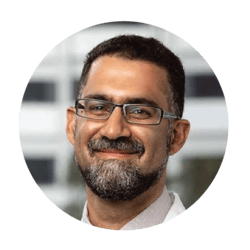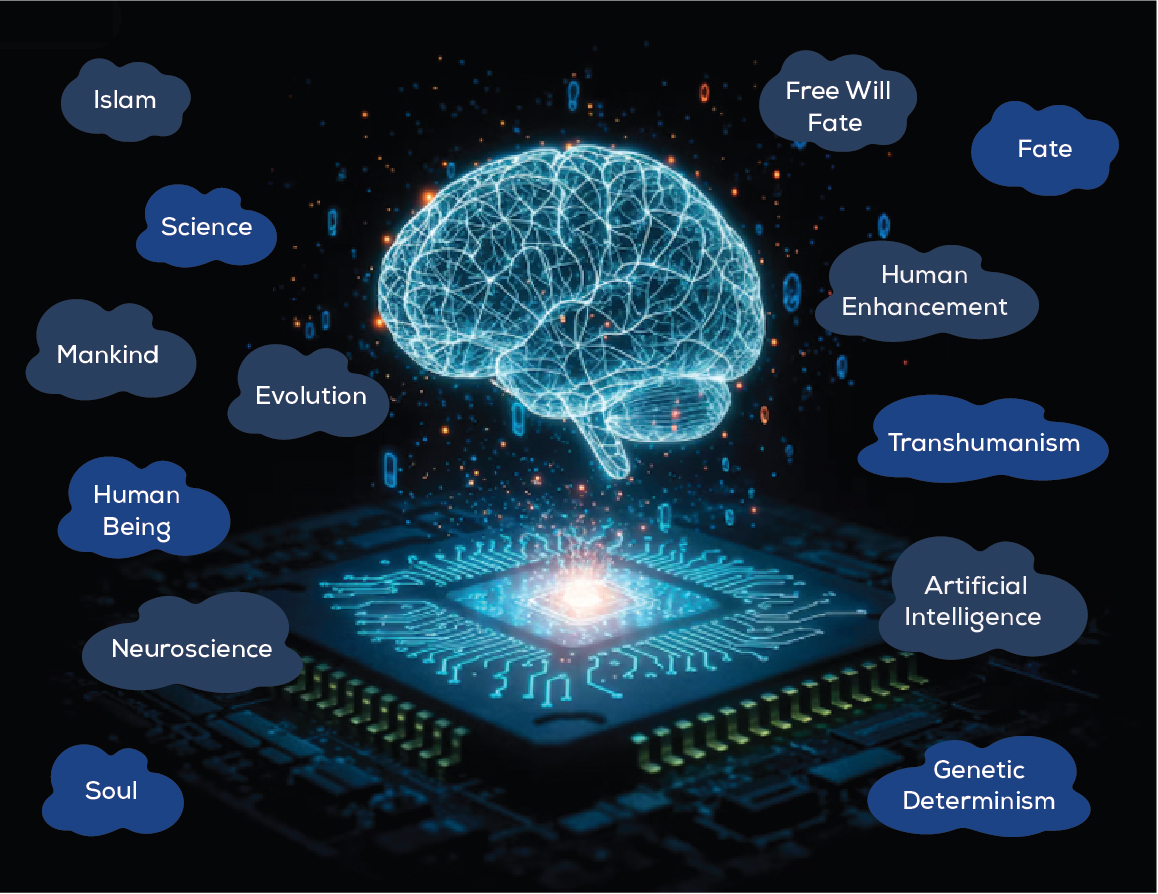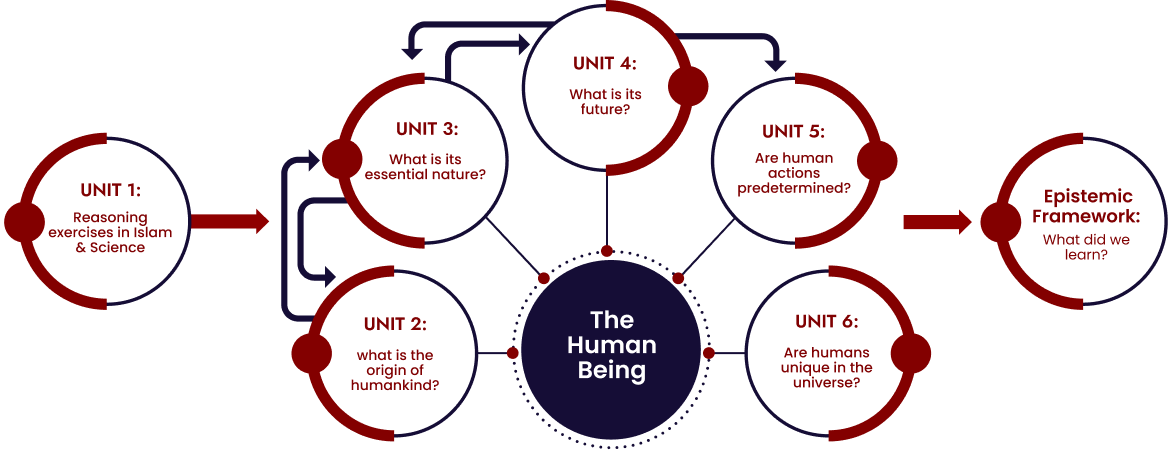The Exploring Bioscience and Islam curriculum is designed for healthcare students and professionals to gain an understanding of how scholars of religion and science approach fundamental questions about the human being. This curriculum addresses five fundamental questions about humankind:
What is the origin of humankind?
What is the human’s essential nature?
What is the human’s future?
Are human actions predetermined?
Are humans unique in the universe?
Today many might assume such questions are in the realm of theologians and philosophers only, incorrectly downplaying modern medicine’s role in addressing these topics. This course was built to highlight the role of physicians in answering these questions as well as to provide students the historical, Islamic, and scientific context within which these questions are considered. This course was built with contributions from physicians, Islamic scholars, philosophers, and professional ethicists in an attempt to equip students with the vocabulary, context, and epistemological framework needed to approach the complex questions that lie at the intersection of modern medicine and Islam.
The curriculum is designed to first establish an understanding of epistemology in Unit 1 after which students are equipped to explore any of the remaining units without being restricted to a sequential order of completion as described by the below image.
Organization Name: Initiative on Islam and Medicine
This course is offered by the Initiative on Islam and Medicine (II&M), a centre dedicated to equipping Muslims with ethical and spiritual guidance at the intersection of religion and healthcare. II&M organizes mosque-based workshops, academic events, and specialized training programs that engage students, professionals, and community members in meaningful discussions around medicine, science, and Islamic thought. Through courses like Exploring Bioscience and Islam, II&M provides practical learning experiences that bridge ethical reflection and professional practice.
Course Features
- Lectures 91
- Quizzes 6
- Duration 30 hours
- Skill level Intermediate
- Language English
- Students 109
- Certificate Yes
- Assessments Self
Curriculum
- 6 Sections
- 91 Lessons
- 30 Hours
- Unit 1: What Do We Know and How Do We Know It?Lecture contributions from Dr. Omar Qureshi & Sh. Hamza Karamali14
- 1.1Unit 1 Learning Objectives
- 1.2Thought Exercise
- 1.3The Islamic Paradigm
- 1.4Galileo Galilei
- 1.5Epistemology, Propositions, and Truth
- 1.6The Sources of Knowledge
- 1.7Thought Exercise: Sources of Knowledge Organizer
- 1.8Spectrum of Certainty
- 1.9Surah An Nisa
- 1.10Judgments/Propositions (ḥukm)
- 1.11Thought Exercise: Classifying Judgements
- 1.12The Necessary, the Probable, and the Impossible
- 1.13Relationship Between Rational Judgments and Empirical Judgements
- 1.14Unit 1 Assessment.10 Questions
- Unit 2: Evolution and God’s Special CreationLecture contributions from Dr. Omar Qureshi & Dr. Shoaib Malik14
- 2.1Unit 2 Learning Objectives
- 2.2Thought Exercise: Ponder…
- 2.3What is Evolution?
- 2.4Deep Time
- 2.5Common Ancestry
- 2.6Evolutionary Mechanisms
- 2.7How Old is the Cosmos?
- 2.8The Origin of Man
- 2.9The Creation of Man
- 2.10What is Man’s Place in the Cosmos?
- 2.11Thought Exercise: Where does man come from?
- 2.12Neo-Darwinism
- 2.13What Can We Accept?
- 2.14Unit 2 Assessment10 Questions
- Unit 3: What Does it Mean to be Human? Neuroscience, Artificial Intelligence and the Soul.Lecture contributions from Dr. Macksood Aftab & Sh. Hamza Karamali17
- 3.1Unit 3 Learning Objectives
- 3.2What Does it Mean to Be Human?
- 3.3The Stages of the Soul
- 3.4Challenges to the Islamic Concept of Human Nature (Ontology)
- 3.5Thought Exercise: What Does the World Consist of?
- 3.6Neuroscientific Reductionism (Scientism)
- 3.7Ibn Sina (Avicenna)’s Floating Man Experiment
- 3.8How Do We Define Consciousness?
- 3.9Neural Correlates of Consciousness
- 3.10Thought Exercise: Mary’s Room
- 3.11The Hard Problem of Consciousness
- 3.12What is Artificial Intelligence?
- 3.13Thought Exercise: The Turing Test
- 3.14The Chinese Room Experiment
- 3.15The Karamali Worship Experiment
- 3.16What Does it Mean to Be Human?
- 3.17Unit 3 Assessment11 Questions
- Unit 4: Human Enhancement and TranshumanismLecture contributions from Dr Aasim Padela & Sh. Hamza Karamali14
- 4.1Unit 4 Learning Objectives
- 4.2Transhumanism
- 4.3Transhumanism Defined
- 4.4Islamic Perspectives on Healing
- 4.5Thought Exercise: What is the relationship between doctors and diseases?
- 4.6Therapy vs Enhancement
- 4.7Thought Exercise: Enhancement or Therapy?
- 4.8Thought Exercise: Reflection on Examples from Today
- 4.9Revelatory Insight into Enhancing Our Beings and Human Features
- 4.10Journey of Our Souls in Islam
- 4.11Transhumanist View vs Islamic View
- 4.12Thought Exercise: Examples from Popular Media
- 4.13Changing the Underlying Narrative
- 4.14Unit 4 Assessment10 Questions
- Unit 5: Are We Programmed or Do We Have Free Will?Lecture contributions from Professor Abdurezak Hashi and Dr Mohd Yusuf15
- 5.1Unit 5 Learning Objectives
- 5.2Beginning with Reflection
- 5.3Free Will & Determinism Defined
- 5.4Examples in Human Life
- 5.5Diving Deeper
- 5.6Defining Natural Instincts
- 5.7Defining Optional Choices
- 5.8Mukallaf, Hidāyah, Qaḍāʾ, and Qadar
- 5.9Four Pillars of the Divine Decree with Proofs
- 5.10Are We Free or Programmed? – Islam’s Conclusions
- 5.11Genetic Determinism Defined
- 5.12Genetic Links to Behavior: Causal vs Association
- 5.13Example: Obsessive Compulsive Disorder
- 5.14The Modern Scientific View on Free Will
- 5.15Unit 5 Assessment10 Questions
- Unit 6: Extraterrestrial Intelligent Life and Human Uniqueness: What does Science & Theology Tell Us?Lecture contributions from Dr. Ahsan Arozullah & Mawlana Bilal Ansari23
- 6.1Unit 6 Learning Objectives
- 6.2Are Humans Unique in the Universe?
- 6.3Definitions
- 6.4Thought Exercise: Is There Life on Other Planets?
- 6.5Evolution of Truth
- 6.6Evolution of Morals and Ethics
- 6.7Understanding Probability and Knowledge Types
- 6.8Case Study: The Seven Earths Question
- 6.9Thought Exercise with Quranic Evidence
- 6.10Quranic Interpretation
- 6.11Searching Hadith for Extraterrestrial Intelligence
- 6.12Hadith Critical Methodology: Sourcing and Chain Analysis
- 6.13Hadith Authenticity
- 6.14The Cohesion Question
- 6.15What Can We Conclude?
- 6.16What Does Revelatory Evidence Tell Us?
- 6.17Thought Exercise: The Scope and Motives of Scientific Inquiry
- 6.18The Philosophy of Epicurus
- 6.19What is the Motivation Behind the Inquiry?
- 6.20The Cost of Investigating Extraterrestrial Intelligence Today
- 6.21Summary: What is your underlying motivation?
- 6.22Bonus Point: Legitimacy of Questioning Theological Understandings
- 6.23Unit 6 Assessment10 Questions



